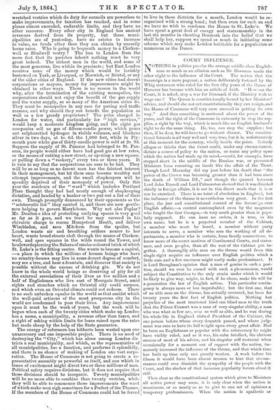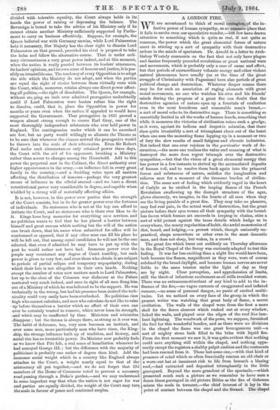COURT INFLUENCE.
NOTHING in politics puzzles the average middle-class English- man so much as an allusion such as Mr. Herman made the other night to the influence of the Court. The notion that the Sovereign is a mere pageant, a notion deliberately fostered by the Whig statesmen who ruled for the first fifty years of the House of Hanover has become with him an article of faith. "How can the Court, it is asked, stop a war for Denmark if the Ministry wish to wage one ? The Queen is constitutionally bound by her Ministers' advice, and should she not act constitutionally they can resign, and the House of Commons will very soon succeed in getting its own way." And then something is muttered about the power of the purse, and the right of the Commons in extremity to stop the sup- plies, a right by the way, which is much like an English husband's right to do the same thing. He, too, can stop the supplies ; but then, if he does, he will have to g3 without dinner. The constitu- tional formula is all very well and very true, but it is, unfortunately at this moment for the country, wholly beside the point. Nobody alleges or thinks that the Court could, under any circumstances, dictate a course of policy to the nation, or resist any policy upon. which the nation had made up its mind,—could, for example, have stopped short in the middle of the Russian war, or prevented' Ministers from resenting an insult like the affair of the Trent. Though Lord Macaulay did say just before his death that "the power of the Crown was becoming greater than it had been since the death of William III.," and though the quarrel between Lord John Russell and Lord Palmerston showed that it was directed chiefly to foreign affairs, it is not in this direct mode that it is or can be exercised. There is no taint of absolutism in England, but the influence of the throne is nevertheless very great. In the first place, the just and constitutional control of the Sovereign over English affairs,—a control contemplated even by the magnates who fought the first Georges,—is very much greater than is popu- larly supposed. He can issue no orders, it is true, in his own name, but he is a perpetual member of the Cabinet, a member who must be heard, a member without party interests to serve, a member who sees the working of all de- partments, a member who is certain, from family connections, to know more of the secret motives of Continental Courts, and states- men, and even peoples, than all the rest of the Cabinet put to- gether. A thoroughly able man on the throne would from this single right acquire an influence over English politics which a little care and a few successes might easily make predominant. It is Lord Brougham's opinion that a man of genius in such a posi- tion, should we ever be cursed with such a phenomenon, would subject the Constitution to the only strain under which it would be likely to give way, might, in fact, if he chose, make his will for a generation the law of English action. This particular contin- gency is always more or less improbable; but the first one, that of an able man on the throne, has actually occurred, has been for twenty years the first fact of English politics. Nothing but prejudice of the most irrational kind can blind men to the truth that the Prince Consort was a man of very singular ability, a man who- was what so few are, wise as well as able, and he was during his whole life in England virtual President of the Cabinet, the one person before whom every despatch passed, and whose judg- ment was sure to have its full weight upon every great affair. Had he been an Englishman or popular with the aristocracy he might have visibly ruled, and as it was, his calm intellect, the obvious success of most of his advice, and his singular self restraint when occasionally for a moment out of rapport with the nation, im- mensely increased the influence of the throne, and that which time has built up time only can greatly weaken. A week before his illness it would have been almost treason to hint that circtun- stances could ever diminish the sympathy of the people with the Court, and the shadow of that immense popularity hovers about it still.
Then clear as the constitutional system which gives to Ministers all active power may seem, it is only clear when the nation is unanimous, or so nearly so as to give to one set of opinions a temporary predominance. When the nation is apathetic or
divided with tolerable equality, the Court always holds in its hands the power of railing or depressing the balance. The Sovereign is bound to take the advice of his Ministry only if he cannot obtain another Ministry sufficiently supported by Parlia- ment to carry on business effectively. Suppose, for example, the Queen believed war with Germany unwise, while Lord Palmerston held it necessary, Her Majesty has the clear right to dismiss Lord Palmerston on that ground, provided his rival is prepared to take the helm and follow the alternative course. That is under ordi- nary circumstances a very great power indeed, and at this moment, when the nation is really puzzled between its leaders' utterances, its leaders' opinions, and its own sense of honour and justice, it is pos- sibly an irresistible one. The tendencyof every Opposition is to adopt the side which the Ministry do not adopt, and when the parties are equal the right of choice between them virtually rests with the Court, which, moreover, retains always one direct power affect- ing all politics,—the right of dissolution. The Queen, for example, without steoping an inch over admitted prerogative undoubtedly could if Lord Palmerston were beaten refuse him the right to dissolve, could, that is, place the Opposition in power for months or years even when the nation if appealed to would have supported the Government. That prerogative in 1831 proved a weapon almost strong enough to coerce Earl Grey, one of the most thoroughly independent aristocrats who ever held power in England. The contingencies under which it can be exercised are few, but no party would willingly so alienate the Throne as to be sure that whenever the chance arrived the prerogative would be thrown into the scale of their adversaries. Even Sir Robert Peel under such circumstances only retained power three days, the Court with the aid of his opponents breaking a Ministry rather than assent to changes among the Household. Add to this power the perpetual seat in the Cabinet, the direct authority over higher appointments in the army,—an influence felt in every great family in the country,—and a deciding voice upon all matters affecting the distribution of honours —perhaps the very greatest means of influence in the official arsenal—and we have a direct constitutional power very considerable in degree, and capable when -wielded by a strong will of materially affecting affairs.
It is not, however, in this power over parties that the strength of the Court consists, but in its far greater power over the fortunes of individuals. No statesman who is not at the top can afford to irritate the Court, and no statesman who is there ever likes to do it. Kings have long memories for everything save services, and no politician wants to feel that he has placed a barrier between himself and great success which nothing but the will of the nation can break down, that his name when submitted for office will be condemned or opposed, that if any other man can fill his place he will be left out, that among equal candidates he will not be the one selected, that even if admitted he may have to put up with the post he would rather not have had. Immense power over the people may counteract any degree of Court hostility, but such power is given to very few, and even those who obtain it are subject to periods of partial eclipse and temporary unpopularity, during which their fate is not altogether in their own hands. Nothing except the number of votes now matters much to Lord Palmerston, but up to the close of the Crimean war disfavour at the Palace mattered very much indeed, and once in sight of all men flung him out of a Ministry of which he was believed to be the support. He was technically in the wrong, but had his presence been desired the tech- nicality could very easily have been overlooked. No politician rises -high who cannot calculate, and men who calculate do not like to raise
• up before themselves a barrier which no effort of their own can ever be certainly trusted to remove, which never loses its strength, and which may be unaffected by time. Ministers and ministries .disappear; but the throne is always there, as strong as it ever was. 'The habit of deference, too, very soon becomes an instinct, and ever some men, more particularly men who have risen, the King- ship, the strange influence built up of tradition, and history, and
social ties has an irresistible power. No Minister now probably feels as we know that Pitt felt, a real sense of humiliation whenever he had annoyed George III.; but the difference with the majority of politicians is probably one rather of degree than kind. Add the immense social weight which in a country like England always attaches to the Court, a weight nearly equal to that of the aristocracy all put together,—and we do not forget that 192 members of the House of Commons voted to prevent a necessary
road passing through a Duke's garden,—and we may understand in some imperfect way that when the nation is not eager for war and parties are equally divided, the weight of the Court may turn the scale in favour of peace and continued surplus.































 Previous page
Previous page